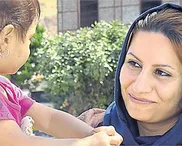6 February marked the International Day of Zero Tolerance for Female Genital Mutilation (FGM). On the day, Sat-7 (Christian broadcaster in the Middle East and North Africa) ran a programme on the practice, hoping to open up the conversation and save lives.
FGM often involves the cutting or removal of the clitoris or other external genitalia. It stems from a cultural belief that women must be circumcised in order to be ‘pure’. Proponents claim that if a woman feels no sexual pleasure, she is less likely to have extramarital sex and will be less ‘demanding’ of her husband. Regionwide, FGM is practiced both by Christians and Muslims, with girls and women living in smaller communities at greater risk.
Dr Shadi Javaheri noted that it is often mothers, or other family members, who arrange for girls to undergo FGM. She spoke plainly of the psychological harm caused. ‘It is nothing but torture and abuse that will stay in the subconscious of the girl for a very long time. When incisions are made and the genitals are mutilated, anaesthetics are not used; the equipment is completely amateur. This is why it often results in serious infection and permanent harm.’







